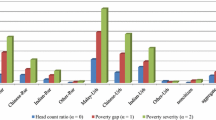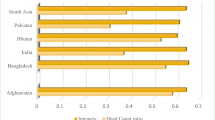Abstract
Energy is a crucial resource which can contribute towards the development and growth of a nation. Therefore, energy poverty can significantly undermine economic, environmental, and social progress of a country. Sub-Saharan Africa (SSA) is the most deprived electricity region across the world, and hence, the energy poverty situation is more severe here compared to other regions. This paper intends to examine the determinants of energy poverty in SSA region considering data from 2004 to 2019. The study specifically focuses on the role of financial inclusion and education in eradicating energy poverty of this region with trade openness, economic growth, and natural resources being used as control variables. The study employs advanced econometric techniques such as pooled OLS, fixed effect model and Driscoll–Kraay standard error methodology. The findings demonstrate that financial inclusion and education significantly reduce energy poverty as both variables increase access to electricity and access to clean cooking fuel and technologies. Trade openness and natural resources have been found to be increasing energy poverty in SSA, while economic growth tends to alleviate it. Based on the above findings, the study provides several policy directions for effective elimination of energy poverty by the means of financial inclusion and education improvement in SSA region.
Similar content being viewed by others
Data availability
The data that support the findings of this study are available in World Bank Indicators at https://data.worldbank.org/indicator.
References
Ahuja D, Tatsutani M, Schaffer D (2008) Sustainable energy for developing countries. In: SAPI EN. S. Surveys and perspectives integrating environment and society 2.1 (September), pp 1–48
Apergis N, Polemis M, Soursou SE (2022) Energy poverty and education: Fresh evidence from a panel of developing countries. Energy Economics 106:105430. https://doi.org/10.1016/j.eneco.2021.105430
Awan A, Bilgili F, Rahut DB (2022) Energy poverty trends and determinants in pakistan: empirical evidence from eight waves of HIES 1998–2019. Renew Sustain Energy Rev 158:112157. https://doi.org/10.1016/j.rser.2022.112157
Bayar Y, Ozkaya MH, Herta L, Gavriletea MD (2021) Financial development, financial inclusion and union transition economies. Energies 14(12):1–14
Boutabba MA, Diaw D, Laré A, Lessoua A (2020) The impact of microfinance on energy access: a case study from peripheral districts of Lomé. Togo Appl Econ 52(45):4927–4951
Cheng S, Wei T, Wang F, Zhuang L (2023) Does financial market participation eradicate household energy poverty? Energy Econ 106687
Dogan E, Madaleno M, Taskin D (2021) Which households are more energy vulnerable? Energy poverty and financial inclusion in Turkey. Energy Econ 99:105306
Dong K, Taghizadeh-Hesary F, Zhao J (2022) How inclusive financial development eradicates energy poverty in China? The role of technological innovation. Energy Econ 109:106007
Eberhard A, Shkaratan M (2012) Powering Africa: meeting the financing and reform challenges. Energy Policy 42:9–18. https://doi.org/10.1016/j.enpol.2011.10.033
Fareed Z, Rehman MA, Adebayo TS, Wang Y, Ahmad M, Shahzad F (2022) Financial inclusion and the environmental deterioration in Eurozone: the moderating role of innovation activity. Technol Soc 69:101961
Filippidis M, Tzouvanas P, Chatziantoniou I (2021) Energy poverty through the lens of the energy-environmental Kuznets curve hypothesis. Energy Econ 100:105328
Fredriksen B, Fossberg CH (2014) The case for investing in secondary education in sub-Saharan Africa (SSA): challenges and opportunities. Int Rev Educ 60:235–259
Garba I, Bellingham R (2021) Energy poverty: estimating the impact of solid cooking fuels on GDP per capita in developing countries—Case of Sub-Saharan Africa. Energy 221:119770
González-Eguino M (2015) Energy poverty : an overview. Renew Sustain Energy Rev 47:377–385. https://doi.org/10.1016/j.rser.2015.03.013
Gregory J, Sovacool BK (2019) Rethinking the governance of energy poverty in Sub-Saharan Africa: reviewing three academic perspectives on electricity infrastructure investment. Renew Sustain Energy Rev 111:344–354. https://doi.org/10.1016/j.rser.2019.05.021
Guo Q, Abbas S, AbdulKareem HK, Shuaibu MS, Khudoykulov K, Saha T (2023a) Devising strategies for sustainable development in sub-Saharan Africa: the roles of renewable, non-renewable energy, and natural resources. Energy 284:128713
Guo Q, Shah MI, Kumar S, AbdulKareem HK, Inuwa N (2023b) The roles of organic farming, renewable energy, and corruption on biodiversity crisis: a European perspective. Environ Sci Pollut Res 30(11):31696–31710
Halkos GE, Gkampoura E-C (2021) Evaluating the Effect of economic crisis on energy poverty in Europe. Renew Sustain Energy Rev 144:110981
Hodžić S, Šikić TF, Dogan E (2023) Green environment in the EU countries: the role of financial inclusion, natural resources and energy intensity. Resour Policy 82:103476
Holstenkamp L (2019) What do we know about cooperative sustainable electrification in the global South? A synthesis of the literature and refined social-ecological systems framework. Renew Sustain Energy Rev 109:307–320. https://doi.org/10.1016/j.rser.2019.04.047
Jayasinghe M, Selvanathan EA, Selvanathan S, Campus N (2021) Energy poverty in Sri Lanka. https://doi.org/10.1016/j.eneco.2021.105450
Koomson I, Danquah M (2021) Financial inclusion and energy poverty: empirical evidence from Ghana. Energy Economics 94:105085
Kuada J (2019) Financial inclusion and the sustainable development goals. Extending financial inclusion in Africa. Elsevier Inc. https://doi.org/10.1016/B978-0-12-814164-9.00012-8
Le TH, Le HC, Taghizadeh-Hesary F (2020) Does financial inclusion impact CO2 Emissions? Evidence from Asia. Finance Res Lett. https://doi.org/10.1016/j.frl.2020.101451
Luan B, Zou H, Huang J (2023) Digital divide and household energy poverty in China. Energy Econ 119:106543
Lusardi A (2019) Financial literacy and the need for financial education: evidence and implications. Swiss J Econ Stat 155(1):1–30. https://doi.org/10.1186/s41937-019-0027-5
Mohapatra NP (2014) Financial inclusion. Econ Pol Wkly 49(33):4. https://doi.org/10.4018/ijabe.2020100103
Nalule VR (2019) Energy poverty and access challenges in Sub-Saharan Africa: the role of regionalism
Nguyen CP, Su TD, Bui TD, Dang VTB, Nguyen BQ (2021) Financial development and energy poverty: global evidence. Environ Sci Pollut Res
Njiru CW, Letema SC (2018) Energy poverty and its implication on standard of living in Kirinyaga, Kenya. J Energy 2018:1–12. https://doi.org/10.1155/2018/3196567
Nkoa BEO, Tadadjeu S, Njangang H (2023) Rich in the dark: natural resources and energy poverty in Sub-Saharan Africa. Resour Policy 80:103264
Nussbaumer P, Bazilian M, Modi V (2012) Measuring energy poverty: focusing on what matters. Renew Sustain Energy Rev 16(1):231–243. https://doi.org/10.1016/j.rser.2011.07.150
Onyeji I (2010) On the determinants of energy poverty in Sub-Saharan Africa. Afr Inst Appl Econ
Pye S, Dobbins A, Baffert C, Brajković J, Deane P, De Miglio R (2016) Addressing energy poverty and vulnerable consumers in the energy sector across the EU. L’europe En Formation 378(4):64–89. https://doi.org/10.3917/eufor.378.0064
Rodriguez-Alvarez A, Llorca M, Jamasb T (2021) Alleviating energy poverty in europe: front-runners and laggards. Energy Econ 103:105575. https://doi.org/10.1016/j.eneco.2021.105575
Sadorsky P (2010) The impact of financial development on energy consumption in emerging economies. Energy Policy 38(5):2528–2535
Shah MI, Zakari A, Kumar S, Abbas S, Sheraz M (2022) Quantifying the effect of waste on soil health in European Union: what are the roles of technology, natural capital, and institutional quality? Environ Sci Pollut Res 29(48):73227–73240
Shah MI, Shuaibu MS, AbdulKareem HK, Khan Z, Abbas S (2023) Inequality consequences of natural resources, environmental vulnerability, and monetary-fiscal stability: a global evidence. Environ Sci Pollut Res 30(4):10329–10345
Singh K, Inglesi-Lotz R (2021) The role of energy poverty on economic growth in Sub-Saharan African countries. Econ Energy Environ Policy 10(1):105–122
Tan D, Adedoyin FF, Alvarado R, Ramzan M, Kayesh MS, Shah MI (2022) The effects of environmental degradation on agriculture: Evidence from European countries. Gondwana Res 106:92–104
Ullah S, Khan M, Yoon SM (2021) Measuring energy poverty and its impact on economic growth in Pakistan. Sustainability (switzerland) 13(19):1–19. https://doi.org/10.3390/su131910969
Wang L, Wang Y, Sun Y, Han K, Chen Y (2022) Financial inclusion and green economic efficiency: evidence from China. J Environ Plan Manag 65(2):240–271
Wang H, Cheng Z, Smyth R (2021) Education quality and energy poverty: evidence from Chinese elite universities
Khan Z, Badeeb RA, Zhang C, Dong K (2023) Financial inclusion and energy efficiency: role of green innovation and human capital for Malaysia. Applied Economics 0(0):1–16. https://doi.org/10.1080/00036846.2023.2206109
Zeraibi A, Jahanger A, Adebayo TS, Ramzan M, Yu Y (2023) Greenfield investments, economic complexity, and financial inclusion-environmental quality nexus in BRICS countries: does renewable energy transition matter? Gondwana Res 117:139–154
Zhang T, Shi X, Zhang D, Xiao J (2019) Socio-economic development and electricity access in developing economies: A long-run model averaging approach. Energy Policy 132:223–231
Zhao X, Ramzan M, Sengupta T, Sharma GD, Shahzad U, Cui L (2022a) Impacts of bilateral trade on energy affordability and accessibility across Europe: does economic globalization reduce energy poverty? Energy Build 262:112023
Zhao J, Dong K, Dong X, Shahbaz M (2022b) How renewable energy alleviate energy poverty? A global analysis. Renew Energy 186:299–311
Funding
The research funding from the Ministry of Science and Higher Education of the Russian Federation (Ural Federal University Program of Development within the Priority-2030 Program) is gratefully acknowledged.
Author information
Authors and Affiliations
Corresponding author
Ethics declarations
Conflict of interest
The authors do not have any form of competing interest.
Ethical approval
Not applicable.
Additional information
Publisher's Note
Springer Nature remains neutral with regard to jurisdictional claims in published maps and institutional affiliations.
Appendix 1
Appendix 1
Generalized method of moments
Model-1 | Model-2 | Model-3 | Model-4 | |
|---|---|---|---|---|
LF1 | 0.0008*** (2.9199) | |||
LF2 | 0.0001*** (2.8940) | |||
LF3 | 0.0026*** (4.0103) | |||
LF4 | 0.00003*** (4.7981) | |||
LE | 0.5366*** (14.0908) | 0.5577*** (14.1091) | 0.5272*** (14.1500) | 0.5578*** (14.8629) |
LT | − 0.1973*** (− 8.0931) | − 0.2118*** (− 8.6395) | − 0.2022*** (− 8.6842) | − 0.2309*** (− 9.6246) |
LY | 0.3153*** (17.6151) | 0.3153*** (17.4353) | 0.3202*** (19.1827) | 0.3264*** (19.3661) |
LNR | − 0.0240*** (− 4.0597) | − 0.0216*** (− 3.7378) | − 0.0218*** (− 3.8180) | − 0.0218*** (− 3.8777) |
C | 0.3298*** (5.2972) | 0.3177*** (5.0887) | 0.3318*** (5.4255) | 0.3151*** (5.2625) |
R-squared | 0.892 | 0.885 | 0.901 | 0.895 |
Root MSE | 0.1232 | 0.1240 | 0.1215 | 0.1225 |
Rights and permissions
Springer Nature or its licensor (e.g. a society or other partner) holds exclusive rights to this article under a publishing agreement with the author(s) or other rightsholder(s); author self-archiving of the accepted manuscript version of this article is solely governed by the terms of such publishing agreement and applicable law.
About this article
Cite this article
Wang, H., Zafar, M.W., Abbas, S. et al. An assessment of energy poverty in sub-Saharan Africa: the role of financial inclusion and education. Econ Change Restruct 56, 4689–4711 (2023). https://doi.org/10.1007/s10644-023-09568-8
Received:
Accepted:
Published:
Issue Date:
DOI: https://doi.org/10.1007/s10644-023-09568-8




